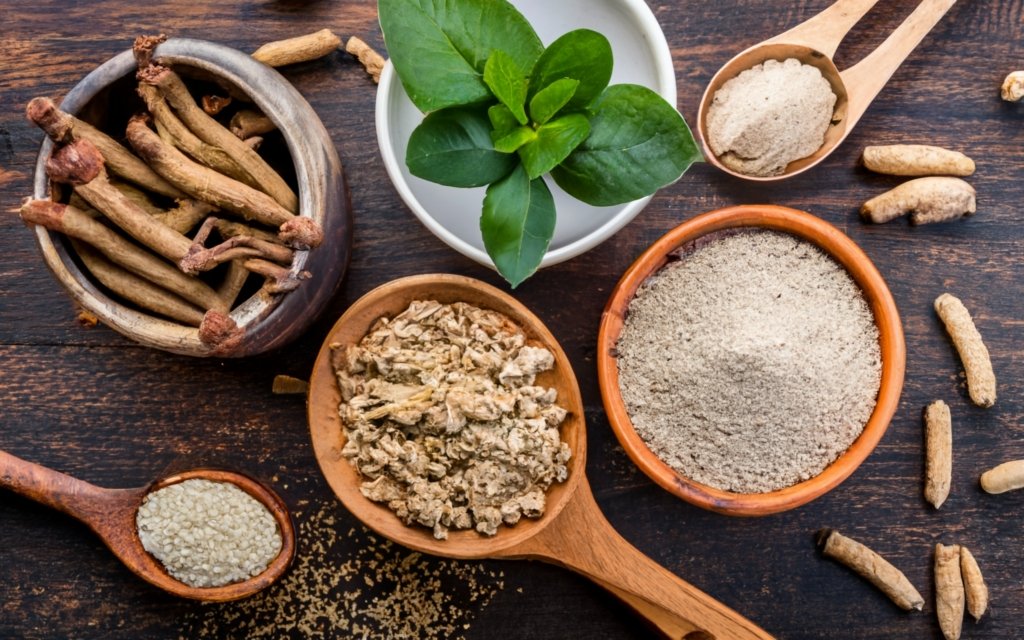(withania somnifera) Ashwagandha, which belongs to the pepper family, is found in India and Africa, it is sometimes called “Indian Ginseng”. The roots of ashwagandha are used medicinally. The health applications for ashwagandha in traditional Indian and Ayurvedic medicine are extensive and include, tumours, inflammation, arthritis and infectious diseases. The shoots and seeds are also used as food and to thicken milk in India. Traditional uses of ashwagandha among tribal peoples in Africa include fevers and inflammatory conditions.
What it does

Ashwagandha contains compounds called withanolides, which are similar to the active constituents in ginseng. It has immune boosting, anti-inflammatory and adaptogenic actions. Withanolides have been shown to influence cardiac muscle contractility and to possess blood pressure lowering properties.
Potential Uses
| Immune function | Stress | Osteo-arthritis |
| Fatigue | Chronic Fatigue Syndrome | Tired all the time |
| Cardiovascular support |
What are the benefits of ashwagandha?
Ashwagandha, scientifically known as Withania somnifera, is an adaptogenic herb with a wide range of potential benefits:
- Stress Reduction: Ashwagandha helps the body adapt to stress by regulating the production of stress hormones like cortisol.
- Improved Cognitive Function: It may enhance memory, focus, and cognitive abilities.
- Enhanced Energy and Vitality: Ashwagandha is known to increase overall energy levels and reduce fatigue.
- Balanced Hormones: It may support hormonal balance, particularly in women.
- Immune Support: Ashwagandha may boost the immune system, helping the body fight off infections.
- Anti-inflammatory Properties: It contains compounds that may help reduce inflammation.
- Improved Sleep Quality: It can aid in better sleep patterns and may help with insomnia.
What are the side effects of ashwagandha?
While generally safe for most people, ashwagandha may cause side effects in some individuals:
- Upset Stomach: Taking ashwagandha on an empty stomach may lead to digestive discomfort.
- Allergic Reactions: Some people may be allergic to ashwagandha.
- Interactions with Medications: Ashwagandha may interact with certain medications, so it’s important to consult a healthcare provider.
- Pregnancy and Breastfeeding: Pregnant and breastfeeding individuals should consult a healthcare professional before using ashwagandha.
Does ashwagandha work?
Numerous studies and traditional use support the effectiveness of ashwagandha for stress reduction, improved cognitive function, and overall well-being. However, individual responses may vary, and it’s important to use it in conjunction with a balanced diet and healthy lifestyle.
How to take ashwagandha supplement?
Here’s a suggested dosage guide for various purposes:
| Purpose | Dosage |
|---|---|
| Stress Reduction | 300-500mg 2 times daily |
| Cognitive Function | 600-1000mg daily |
| Energy and Vitality | 500-1000mg daily |
| Hormonal Balance | 300-500mg 2 times daily |
| Immune Support | 500-1000mg daily |
| Anti-inflammatory | 500-1000mg daily |
| Sleep Quality | 300-500mg 2 times daily |
Always consult with a healthcare professional before starting any new supplement regimen, especially if you have pre-existing health conditions or are taking medications. It’s also important to choose a high-quality, reputable brand for ashwagandha supplements.
Other information
Evidence suggests that ashwagandha may be able to both boost a weakened immune system and suppress an overactive one. The latter action would theoretically offer great potential in auto-immune disorders such as rheumatoid arthritis, multiple sclerosis, lupus, etc. Numerous studies show ashwagandha to be superior to even panax ginseng as an anti-stress adaptogen.
Cautions
Generally, there are no side effects or contra-indications from using ashwagandha.
This herb has sedative actions and should be avoided if you are already taking anti-psychotic medication, tranquillisers or anti-convulsants.
Do not use when pregnant or breast feeding.
Ashwagandha should not be used by children under 12 except under supervision of a qualified herbalist.
At the time of writing there were no well known negative drug interactions with Ashwaganha.





